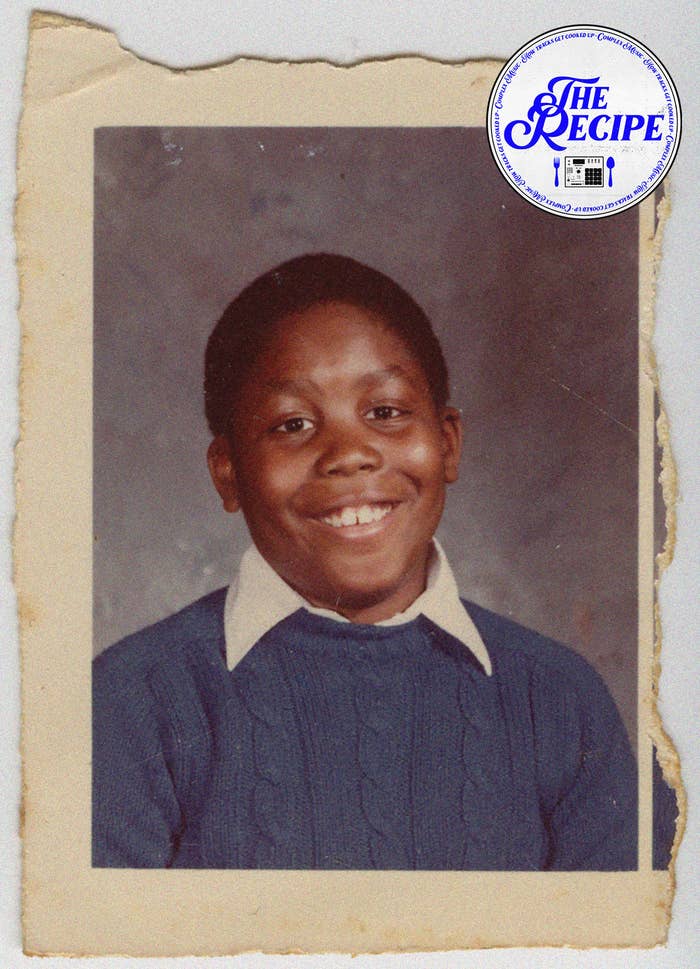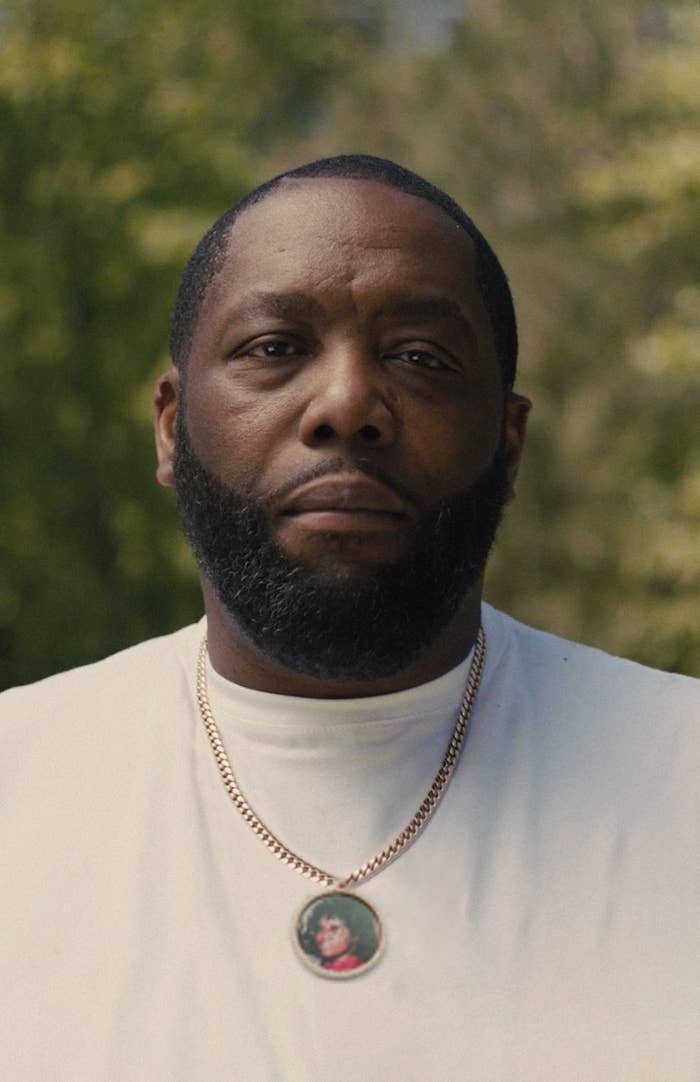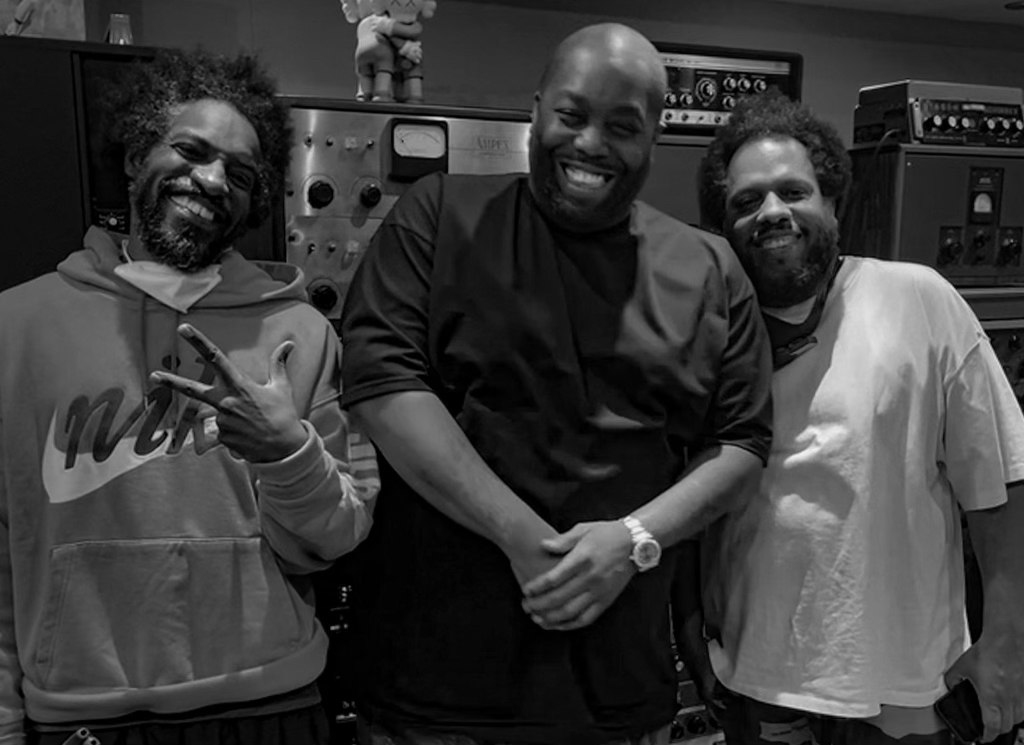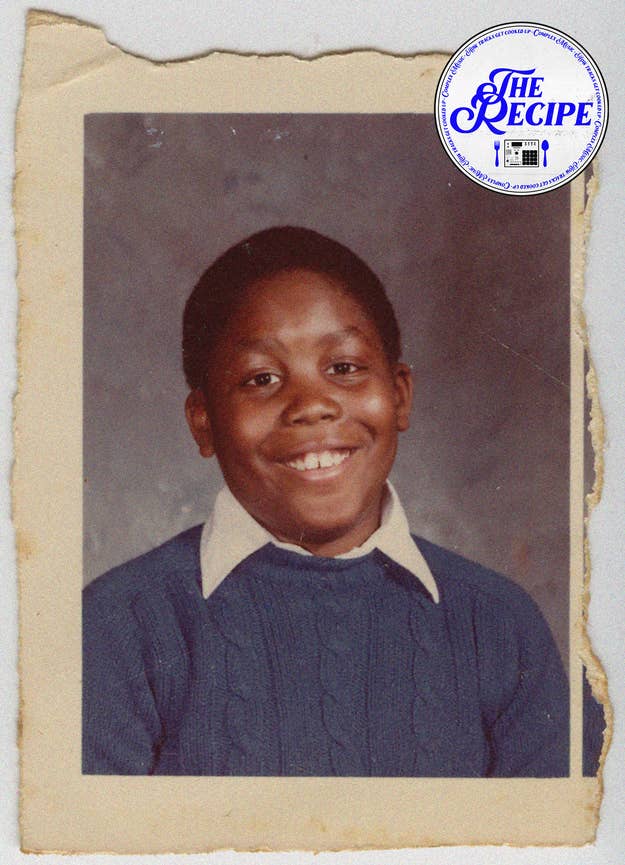
This is The Recipe, a space where standout artists and their closest collaborators sit down with Complex to provide insight into their creative processes.
In June, Killer Mike released one of the best albums of the year. The Atlanta rapper’s sixth studio album, MICHAEL, was his first solo record in 11 years, and he didn’t disappoint.
Across 14 songs, Killer Mike, born Michael Santiago Render, pours out his soul in pages that touch on everything from young love and abortion to tremendous loss and, ultimately, finding rest. It is a thoughtful, thought-provoking project that finds the Run the Jewels rapper leaning on his writing chops, vulnerability, and timeless production by way of a handful of stellar producers, with the legendary No ID at the helm. Mike and No ID weaved together story and sound effortlessly after over a decade of friendship and minimal work together prior.
Sonically, it’s supported by a dream team of collaborators, including featured artists like Andre 3000, Blxst, and Young Thug, as well as the soulful voice of Eryn Allen Kane, who floats through the project, giving it a gospel feel that’s meant to evoke the memories and warmth “between Saturday nights and Sunday mornings in the Black community.”
“My grandmother, who took me to church [on Sundays], had an amazing band and songstresses. They were the same people that played in the nightclubs and juke joints [on Saturdays],” Mike says. Looking to encapsulate that feeling, he also knew, “It’s gotta be unapologetically Atlanta, unapologetically Southern and unapologetically Black.”

And when the time came to solidify the project’s backbone, Michael knew who to call. “Dion’s a fucking hero of mine,” he says of No ID (Dion Wilson). At the time, No ID was on an unofficial break from music, focusing on fatherhood. “You got to experience life to score it properly,” he tells Complex.
Since Michael’s triumphant release, Killer Mike has revisited the album’s heart-wrenching “Motherless,” alongside R&B legend Robert Glasper, and offered a deluxe version of the project, with four sweet additions.
In conversation with a few of his closest collaborators, it is clear that this is the best of Mike. “Mike has been fearless on the album with his willingness to let people into his life and see a very personal side of his,” creative director Adam Farrell says. “I've always respected from afar and love just politics and his sense of social justice and actionality. But to have, finally, the opportunity to work with him on music where all that is coming to light. And now we're telling he's doing that through music almost for the first time on a personal level, it's been a privilege.”
Below, we break down the project’s recipe in never-before shared detail—from how the cover art came together, to what they were listening to in their free time while creating, and more.
CHEFS IN THE KITCHEN
Mike tapped a few friends, old and new, to help him introduce the world to 9-year-old Michael. Some, like Christopher, considered themselves “tourists,” visiting the world Killer Mike has created for himself to help translate it to others. While others, like Dion, were longtime friends who were patiently waiting for the right moment to work together.
Killer Mike (Michael Render) - Rapper, Executive Producer
Cuz Lightyear - A&R
No ID (Dion Wilson) - Executive Producer
Will Bronson - Executive Producer
Adam Farrell - Creative Director
Christopher Leckie - Art Director
Dammo Bass
Agape Jerry - Lead guitar
Warryn Campbel - Keys
Eryn Allen Kane - Lead voice
Greazy Wil - Engineer
Ray Murray - Spiritual Advisor
Rico Wade - Narrator
Honorable C-Note - Producer
Corey Mo - Producer
Cool - Producer
Dre - Producer
DJ Paul - Producer
TWhy Xclusive - Producer
Migui Maloles & MixedbyAli - Mixer
Nicolas de Porcel - Mastering
Demitrius Lewis II - Assistant Mastering Engineer
Featured Artists: Young Thug, 6LACK, El-P, Thank You Good Sir, Future, Curren$y, Kaash Paige, Blxst, Ty Dolla $ign, Mozzy, CeeLo Green
On how Killer Mike and No ID came together for this project:
Killer Mike: Bear introduced us years ago. I was already a fan. I was already a hip-hop nerd ass fan from the stuff he had did with Common and his background in terms of the way we understood history, especially Black history, stuff like that. It was just like Lego blocks sitting together. He was just, I don't have any biological brothers, but I have a lot of brothers and spirit and he quickly just became a brother and spirit and he's one of the most talented producers and thinkers in the world. It was early on. Bear wanted us to hook up and early on, I wanted them to do a project for me, but I was still so young and not knowing what I wanted to do and how to do it and be assertive in it that I kinda bullshitted around and shuck and jive for a few years until he finally called me like you know, you playing around, but whenever you're really ready, I'm here and, in the process of making Michael, I realized I'm finally ready, about 15 years after meeting him, so I’m glad he kept my coupon.
No ID: You forgot “God in the building!”
Killer Mike: Oh man, that's the predecessor to all this! Absolutely. Thank you for remembering. Marijuana robs the memory, but it definitely makes you warm and fuzzy about the friendship. [Laughs.] He gave me a major league beat when I was in the underground kind of fumbling around the miners trying to find myself. So, yeah, we did do some work together that showed the potential, but it was just the right season. And thank God. I think we have an album that's gonna live like Curtis Mayfield lived like Stevie's music has lived, like Biggie and Pac has lived. We've created something timeless and I'm very proud of it.
No ID: I'm a big believer in human alchemy and sometimes I just look at people and think about what would happen if certain people just exchange energy. So I always knew he was incredible rapping, but deeper than that. I know he was like, incredible talking, incredible thinking and that's rare to me. So I think I'm probably the most patient person in music history for real and it's a season for everything. So, you know, the next best thing to do is just have a good friendship with someone until the season comes.
Adam Farrell: Eryn Allen Kane [who No ID co-manages] was so incredible. She just brought this level of musicianship and inspired vocal performance that you can feel It really turns your soul when you listen to the album and Eryn is such a huge part of that and just seeing her in real life doing it was so inspiring, And I was something Mike demanded Yeah we need to have Eryn in this video So everyone jumped through hoops and move mountains to make sure she could be in it.
Everyone was authentic. I mean the young man that plays young Mike in the motherless video is his son. And Ponyboy’s daughter did hair and makeup, so Mike really brought his family, and all the cars are his actual cars and stuff. So we imbued a bunch; as much as the art direction and casting that we could do that came from his people and his world was what we tried to keep close to make it feel like it's actually coming from Mike's world which is, what this album is really.
KEY INGREDIENTS
When Dion and Killer Mike finally came together, they made magic. Dion made “a hundred and something beats in a month” that were then used to shape the sonic spine of MICHAEL. Below, they touch on what inspired their work.
No ID: I’m inspired by the rich history and soul of Southern music and the edge of it. And I just kind of kept my eyes on that prize…. I had taken my first break I ever took from doing music when I had my daughter for eight months. I didn't do music. And when I came back from that, I promised myself I would just do a lot of beats and return to my younger self. And a lot of the first stuff I sent him when he said he wanted to work was from that exercise and it wasn't me working on a project, it was actually me just trying to recapture my old young spirit which is a hip-hop kid, just like he’s the 9-year-old Michael trying to be killer Mike.
On what was playing in the background:
Adam Farrell: I went from Vietnamese psych rock to Canadian drill.
Killer Mike: I was listening to Curtis… I was trying to make sure that I re-grounded myself in the South. My wife and I rolled around in her Range Rover and sang the most ratchet ass ‘90s Southern raps you could possibly hear.
Dion: I felt myself listening to older music and not listening to current music. And I asked myself, why is that? And I realized that the business had infiltrated a lot of my favorite creators… and I was like, I don’t know that I like current music more than I like older music. It was just a natural realization of what I was listening to and I didn't have nothing to do and I wasn't trying to make something and it kinda brought me back to why I did music, which is, I just wanted people to appreciate what I make. It wasn’t about being a great producer when I was listening to music. It was about making music that people can enjoy and have some depth of perception about it and have some intricacies and don't worry about what the business is. So, I was really listening to a lot of classic playlists, from the ‘70s to 2000s. I was going “What do I like?” Not what was a hit. Not what was a success. Not what was accredited. What do I like? What do I wanna play when I'm sitting in my yard, feeding my koi fish like a bougie successful producer that I am? [Laughs.]
TABLE SETUP
Killer Mike and his cohort made this project in Atlanta, recreating images and places of his past with great care and accuracy. Creative Director Adam Farrell explains:
Adam Farrell: The South and Atlanta specifically is such a part of the story of this album that we felt like representing it as the backdrop for all the visuals was really important. And obviously Mike has a lot of collaborators and a lot of people there, so we thought to tell an authentic story, it was really important to work down there in the environment that he's used to, and to have his people around him, because this is very much about the experience for a Southern Black man in America.
THE RECIPE
On the album cover's meaning:
Christopher Leckie: It's a very honest portrait of Mike. Jonathan Mannion was staying with Michael and living with him and documenting his life and all the places that he enjoys and finds joy and all the things that he likes. But it all kind of culminates in this portrait and so, I added the halo. But for whatever reason I'm looking and I'm thinking, he's cheeky though, he's got a cheeky grin, like a Dennis the Menace type character. And so then I start experimenting with drawing horns in there too. And I felt like it played so well into this thing of what he represents; he means a lot of different people, but he’s very honest about that and is just kind of like “this is who I am.” And I love the record as an honest portrait of who he is at the moment. And so I felt like all of those things—who he is as a grown man, is present in him, and is present in all of us, as children. The incredible image that Jonathan had provided us was at the strip club, or with this family, and all things in between, and the religious thing. So, the narrative of sinner and saint became really apparent, and it was fun to play with that. It ends up saying that nobody's, just 100 percent this or 100 percent that. But this is him.
On how “Scientists and Engineers” came together:
Killer Mike: I've been asking Dre to get on something for a decade. He's always been like “the song hard. I just don't, I'm not into the rap right now,” or he'll be like, “you know, I just, I can't find inspiration.” And this time we just called Dre to listen to the album. We called him with no expectations. And I remember him asking, could he bring something back to play the next day? And I was like abso-fucking-lutely. And after that, I let the two masters work. I have a picture of us together and it's like I'm sitting here with two Yogi masters like “your life's about to change.”
No ID: I just happened to know James Blake really well, he’s a good friend and he'd always tell me “I work with Andre and he don't put the music out.” So when Andre came back the next day after he listened to the album and brought a piece and it had a piece of James in there, you know, as a producer, I kinda already knew the context and I knew it was gonna take a village. And, at that point, Killer knew it was gonna take a village, too, and you know, a lot of the times the best music is created by a village [but] sometimes, a lot of the times, getting personal credit or different accolades or money can get in the way of that. But luckily, happily, it was the season for him.

No ID: Andre [and I] see each other at the weirdest places and just talk about the weirdest things. When I lived in Atlanta, I just see him at Whole Foods and we are just talking Whole Foods very innocently. So I felt like it was all very innocent and it wasn't strategized. I remember when Killer said “I'm gonna have him come through and see what he thinks.” And I was just like, “yeah, you know, depends on how the weather is that day.” [Laughs] You never know. And, the weather was good. The weather was good.
On the final track they made, “Motherless”:
No ID: He says I pushed him [to make it], I say he pulled me into pushing him. You know, when people really don't wanna talk about something, they don't bring it up. But when people really want to talk about something and don't know how they gonna get to it, they bring it up and you know, if it's anything that I care about more than anything about me being a creator of music, it is that we are human beings, right? This whole music thing don't mean nothing if there's no human humanity in it. So, why should this even be done? Is really where my spirit, as an executive producer, is at now. We got millions and millions and millions of songs every year. Why do we need more? Well, it's gotta be because it gotta mean more.
On the “Motherless” + “Don't Let The Devil" videos:
Adam Farrell: It's hard to talk about “Motherless” without talking about “Don't Let the Devil” first, because they kind of operate together. It really got to the core of telling the story of what Michael's mom meant in a larger sense, being this heroic figure to Mike. And there's somewhat tragic sensibility to it as well, but largely, she was a woman that took great pride, having Michael at a young age, I think she had him at the age of 15 and it was something she wanted. I remember, Mike would tell us stories about how she would proudly walk around pregnant in high school. And this was all very intentional that she brought Mike into the world, with a great level of intentionality. And so we thought that between “Don’t Let the Devil” [for which rapper EI-P wrote the video] and “Motherless,” we had a great opportunity to tell a story about his mom and relationship with her, and her kind of, like, overall spiritual impact, she had on the album.
Adam Farrell: We tell the history of her and those parties that she used to throw in the basement of Mike's house back in the ‘80s. And then we wanted to tell a deeper emotional story, and almost trace the entire arc of her life in the “Motherless” video. So, “Don’t Let the Devil” kind of tees her up as a character. And then “Motherless” tells almost the entire story of her from being a child through, when she passed away.
We wanted a place that felt kind of ‘80s and that was actually really hard to find in Atlanta. Here in LA you have a lot of period houses; if you want ‘80s ‘70s, midcentury, whatever, you can find houses everywhere but Atlanta tends to have a very specific tone. But we found a place and it had the right carpeting and it had a basement with a bar that we did the bar scene in with a poker table, I mean, that was all there. We didn't have to bring any props to that, the house was basically ready. So we turned the house into Denise's house for the two videos, and the living room where she passed away in, and where Mike comes into. So you can see that continuity and I think that continuity was really important to make those a one-two punch and videos that really work together to tell a comprehensive story about Denise.
On the album’s purpose:
From the onset, Mike’s intentions with this project were clear: “I wanted people to feel something," he says. "It’s gotten to the point where the only thing we feel is insecurity and ego. We don't feel love. We don't admit we feel pain. We're not offered songs like “Something For Junkies. We don't offer empathy for Black people throughout the diaspora. That's just not our way,” and one of my favorite lines of any record ever is when Mos Def said “I want Black people to be free.”



